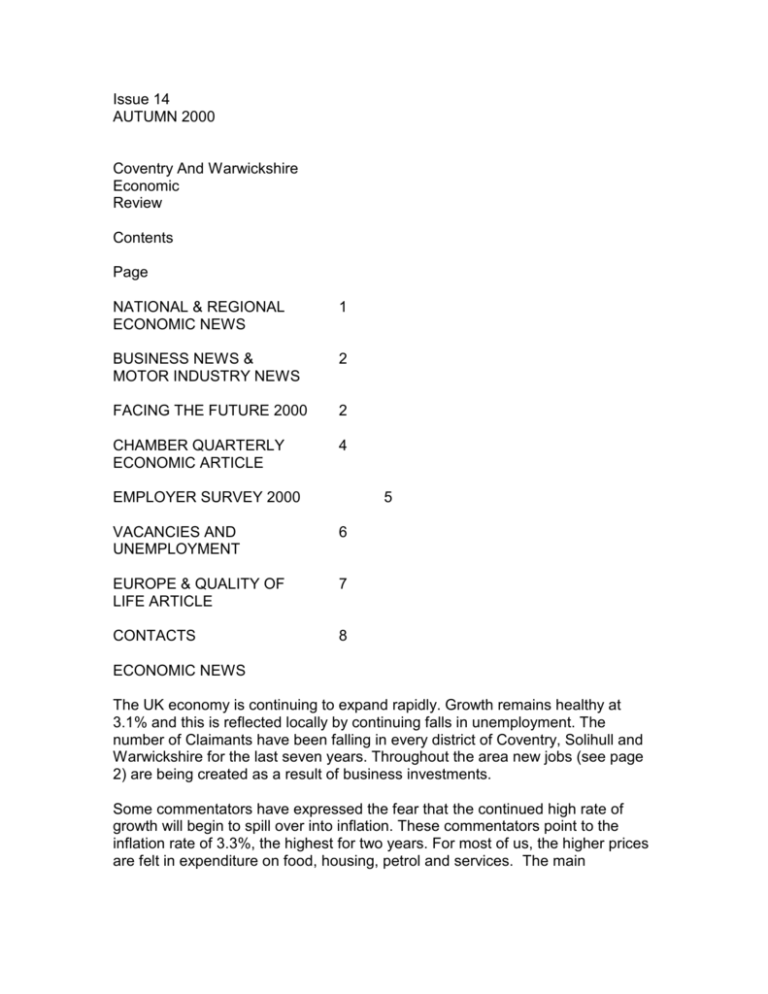Document
advertisement

Issue 14 AUTUMN 2000 Coventry And Warwickshire Economic Review Contents Page NATIONAL & REGIONAL ECONOMIC NEWS 1 BUSINESS NEWS & MOTOR INDUSTRY NEWS 2 FACING THE FUTURE 2000 2 CHAMBER QUARTERLY ECONOMIC ARTICLE 4 EMPLOYER SURVEY 2000 5 VACANCIES AND UNEMPLOYMENT 6 EUROPE & QUALITY OF LIFE ARTICLE 7 CONTACTS 8 ECONOMIC NEWS The UK economy is continuing to expand rapidly. Growth remains healthy at 3.1% and this is reflected locally by continuing falls in unemployment. The number of Claimants have been falling in every district of Coventry, Solihull and Warwickshire for the last seven years. Throughout the area new jobs (see page 2) are being created as a result of business investments. Some commentators have expressed the fear that the continued high rate of growth will begin to spill over into inflation. These commentators point to the inflation rate of 3.3%, the highest for two years. For most of us, the higher prices are felt in expenditure on food, housing, petrol and services. The main contributions to these rises have been seasonal factors, taxes and commodity prices. For the moment these prices rises are not the result of rising domestic inflation as non-food manufacturing factory gate prices have risen by 1.2%. These rises are kept to a minimum as highly competitive markets are limiting the extent to which businesses can raise prices. However, manufacturing input prices have risen by 9.5% over the last year. This rise threatens to squeeze business confidence and profitability in manufacturing. Commodity prices are the main contributor to rising manufacturing input prices, which also affect many services. Oil prices account for 71% of the rise in input prices, higher metal prices, 15%, and chemicals, some 8%. Oil prices have risen sharply in the last two years as the world economic expansion has met limited oil supplies. Early this year oil prices reached a record of $us33 per barrel before falling back to $us25 per barrel. News that US oil stocks are low sent the price back up again to $us30. Despite OPEC wanting prices to settle at $us20, they are likely to fluctuate as long as oil production remains limited. Another potential threat to business profitability is the increasing tightness of the labour market. With unemployment rates ranging from 1.1% in Stratford upon Avon to 4.1% in Coventry and Nuneaton & Bedworth, employers are facing a diminishing pool from which to recruit. The 2000 Employers Survey, showed some 37% of businesses reported that they were finding jobs hard to fill. With output prices constrained, businesses cannot afford higher wages to attract staff. There are many thousands of people in the sub region wanting to work but who are, for some reason, not able to do so immediately. Training and breaking down barriers to employment are the key factors which will help them into work. This will help ensure that the tight labour market can continue to function without wage drift putting pressure on businesses. The third cost-push factor facing business is interest rates. Should the economy begin to over reach itself, the Bank of England will put up interest rates in order to slow the economy. As a result, Sterling could rise against the Euro and fall against the dollar. This would add to competitive pressures whilst raising input costs. With Euro pricing creeping in, exchange rate movements have become a major worry for many sub-regional businesses. Competition has meant that many sub-regional manufacturing and service sector businesses have sought to improve competitiveness, reduce inefficiency, raise total factor productivity and source cheaper inputs. The process is not easy and is helping restructure the sub region’s economy. So far, the sub regional economy has managed to win the battle against inflation. BUSINESS NEWS Coventry car makers Jaguar have had a very successful start to the year with 40,000 sales in the first five months of the year, an 80% rise on the same period of last year. This is due to increased sales in France, Spain, Italy and Japan and also to their new presence in Formula One, which has stimulated interest in the Jaguar range. The Council has confirmed that it has held discussions with Ikea to find a suitable site for a new store which would bring around 400 jobs to the City. This is part of the furniture giant’s major expansion of 20 new stores which should create 10,000 jobs. A new study, which will offer an insight into the type of skills needed to secure employment, is to be started in North Warwickshire. Consultants will investigate the type of businesses operating in the area, their business needs, and identify the sorts of jobs likely to appear in the Borough over the coming years. It is hoped the study will be completed by November and that the Council will be able to implement any findings to help reduce the numbers of unemployed people. Thirty jobs at the Parcelforce international delivery hub at Coventry Airport were on offer at an employment roadshow in Coventry in August. The jobs included positions for LGV drivers and also offered free LGV training for the long-term unemployed. This is part of the firm’s drive to fill gaps in their workforce, which will swell to 600. Rugby firm AW Precision has been chosen to give a demonstration of production excellence to the Prime Minister. They will reveal techniques they have learned during manufacturing master classes on a 6-hour test to improve a production line, which they have not previously seen. The firm was chosen from among 400 manufacturers to give the demonstration. The company’s success has already been hailed by the Coventry and Warwickshire Business Community, as it was runner-up in the Jaguar sponsored Business of the Year category. Retailer Littlewoods has opened a discount store in Coventry creating 25 jobs. The store has opened at Central Six Retail Park in Coventry. The new jobs are a mixture of part time and full time positions including management roles. Aston Martin’s decision to seek approval to build a new assembly plant at the Ford/Land Rover owned site in Gaydon in Warwickshire is another vote of confidence for the West Midlands car industry. Components supplier Visteon are also looking for a site in the County. The strong pound and the problems at Rover are being blamed for 65 redundancies at a Coventry factory. The job losses have been announced at Dunlop Topy Wheels who manufacture steel wheels for cars. The redundancies will involve 57 shopfloor workers and eight clerical staff. The new Pro Logis Business Park development in Coventry has received dozens of enquiries from firms wanting plots on the site. The development is well advanced and will be ready for occupation in early 2001. Up to 50 jobs will be created when a fast expanding discount designer retail store opens in Coventry. TK Maxx is to open an outlet in the Gallagher Retail Park in the Autumn. The new site will stock famous label clothes, together with homeware and gifts. More than 3,000 jobs are expected to be created in the West Midlands as a result of a £350 million investment in the region by supermarket chain Sainsbury’s. This employment will be generated by a string of new stores and also the development of a regional distribution centre employing 750 people, next to the M42 at Hams Hall, North Warwickshire. Planning consent has been granted for a three acre site in the heart of Coventry to be developed into a mixed business and residential scheme. It is a major boost to the City and is the largest office development at 9,900 sq.metres since the seventies. It has been pre-let to the Inland Revenue Customs and Excise Agency to provide more open and accessible tax administration for the West Midlands. Marconi has unveiled its third major contract in Germany adding to a long string of successes on the continent this year. Marconi is creating more than 2,000 jobs in the West Midlands in the next 5 years. The firm is moving its communications and services activities from New Century Park to a large site at Ansty, on the edge of the city. Coventry University and the University of Warwick among others in the Midlands are to benefit from the Government’s higher education reach out for businesses on a community fund with nearly £2 million pounds being made available. This has been given to further strengthen their links with businesses in their sub region. The Lower Precinct re-development is underway in Coventry. Much interest has been shown in the site of the soon to close C&A store due to its prime location in the City Centre. MOTOR INDUSTRY NEWS Car Manufacturers A key problem facing the car industry has been the new round of investment due to secure the future of production plants. Ford has dropped production at Dagenham with the new Fiesta due to be built at Cologne. Honda has decided to take the long view. Production will double in 2001 with the creation of 1,000 new jobs. The company intends to ride out the high pound by selling to Japan as well as Europe, operating at higher capacity rates and by importing more from euro priced suppliers in the UK and abroad. Toyota has suffered a major drop in profits and has decided to cut costs and increase output by 30%, to 230,000 cars, by adding production of the three door Corolla to the Burnaston track. The transfer of production from Japan boost help reduce production costs and offset the very high value of the yen. The performance of Nissan has badly affected Renault’s profitability. The company is looking to cut costs in the UK even though the 300,000 car plant in Sunderland is the most productive plant in Europe. The company is negotiating with the Government on its next moves and is seeking severe cost cuts. The first strike to hit Peugeot in 22 years has been successfully resolved. The dispute was over working hours following the introduction of a third shift. Negotiations are continuing in an effort to avoid a prolonged strike that could compromise the operation of the plant. Post Rover break-up As expected, Rover sales have reduced slightly, however, the company has not yet taken up the £200m loan facility, which was part of the break up deal. In recent months, the new management has started to fill gaps in the company resulting from the break up. With Gaydon going to Landrover, Rover’s lack of design capability is being tackled with the recruitment of designers and engineers. BMW profitability has recovered now the Rover losses are excluded. Production of the new mini at Cowley has started. The Ford Premier company, Aston Martin, has decided to locate its third factory at Gaydon, home of sister company, Landrover’s R & D and test track. This will create some 400 new jobs and will help balance the activities at Gaydon following Rover’s exit. Car Prices Car manufacturers face continued pressure on prices. It has been suggested that some 15% of UK car buyers are now buying direct from mainland Europe either using the internet or agencies. The European Commission is concerned that car prices are not falling in line with the strength of the pound. Many car manufacturers have started to offer discounts and cash backs. Mercedes has announced a straight 20% UK price cut. The DTI have announced that some traditional dealership practices, especially on trade discounts, are not in the public interest. The abolition of these practices in September are expected to lead to a 10-15% cut in car prices. However, even after these cuts British consumers will still be paying more than their mainland equivalents. The very competitive nature of the car market means that consumer prices are set to fall. This means that car manufacturers, on top of everything else, are facing falling prices at a time of exchange rate firmness. Component Suppliers The UK components industry has a turnover of approximately £12 billion and employs some 150,000 people in about 7,000 companies. About 27% of companies in the sub region have some turnover linked to the automotive sector. The continued exchange rate disparity of the pound with the euro is having ramifications on automotive component suppliers. Toyota is seeking to transfer the exchange rate risk onto suppliers by asking them to price in euros. Other companies are thinking of following Toyota either through direct imports from euro countries or by encouraging euro pricing in Britain. This effectively means that prices will have to fall substantially. Newly floated from Ford, Visteon, an automotive parts supplier, is set to reorganise procurement in the Ford premier plants of Jaguar, Landrover and Aston Martin. Suppliers will be expected to meet Ford standards, invest in new technology and clamp down on their costs. Many of Jaguar’s suppliers have already gone through this process. This will affect suppliers at all tiers. It is likely that Visteon will set up a major new operation in Warwickshire. Facing the Future The Coventry and Warwickshire Economy 2000 The performance of the Coventry and Warwickshire economy has been particularly strong since the mid 1990’s. As a result, the local economy now differs considerably from that of the West Midlands Region, out performing the Region across a range of economic indicators. Prospects remain good with a number of significant developments, such as the Arena project on the former Foleshill Gasworks, and the Marconi development at Ansty, likely to boost the performance of the local economy over the coming years. However, there are still a number of areas where attention needs to be focused to improve performance. Facing the Future has identified the following key trends in the local economy; l Economic growth rates are higher in Coventry and Warwickshire than both the West Midlands Region and nationally. Forecasts suggest that growth rates in Warwickshire will be the highest of any county in the West Midlands Region over the coming years. l Investment levels amongst local employers have been particularly buoyant over the past three years, with investment intentions remaining strong. l Exporting has remained at fairly stable levels in the sub-region over the past three years despite the strength of the pound. l The profile of jobs locally has changed considerably over the last ten years. Whilst there has been a large fall in the number of manufacturing jobs, more job opportunities have been created in banking, finance and business services, transport and communications, distribution, and hotel and restaurants. l The numbers of people in full time work has been gathering pace over the past two years, the rate of increase outstripping growth regionally and nationally. l Strong levels of recruitment activity is resulting in some employers having difficulty filling jobs, mainly due to lack of applicants, industry wide labour shortages, or lack of trained applicants. l Unemployment rates are lower in Coventry and Warwickshire than the regional and national averages. In some Warwickshire wards joblessness stands at less than 1%. However, in some of the inner city wards jobless rates are more than twice the national average. l There are eight wards in Coventry and Warwickshire where levels of deprivation place them amongst the worst 10% of wards nationally, based on the 1998 index of deprivation. l The focus of regeneration activity in the north of Coventry and the northern parts of Warwickshire will open up new job opportunities to residents in the most deprived parts of the sub-region, and those areas which have suffered through long term industrial change. These include the decline of the mining industry in Warwickshire, and the loss of certain manufacturing employment from northern Coventry and Nuneaton & Bedworth. l Employers in Coventry and Warwickshire look for a balanced range of skills from their workforce, with ‘people skills’ including customer care and communication skills increasing in importance. At the same time practical and technical skills remain important, as do IT skills. l Qualification levels are higher amongst the Coventry and Warwickshire workforce than in the West Midlands or nationally. Some 23% of local working age residents hold a qualification at NVQ Level 4 or equivalent, compared with 18% in the West Midlands. For a copy of the report contact; Andy Davis, Warwickshire County Council ~ research@warwickshire.gov.uk Jane Holland, The Chamber ~ janeh@cw-chamber.co.uk Myles Mackie, Coventry City Council ~ myles.mackie@coventry.gov.uk CHAMBER QUARTERLY ECONOMIC REVIEW - 2nd QUARTER 2000 The Chamber quarterly economic survey is a barometer of the economic climate in Coventry and Warwickshire. It provides an up-to-date picture of how companies feel about a range of issues affecting business in the sub-region. The results of the second quarterly economic survey 2000 indicate that the optimism shown in the first quarter has given way to slight apprehension with regard to the economic climate across the sub-region. The Rover crisis will have caused some lingering concern. A large drop in business confidence in the manufacturing sector was recorded. The balance* figure for ‘future turnover to increase’ dropped by 29% to stand at 34%, still higher, however, than at this stage in 1999. The service sector in contrast noted a much smaller drop of 3% in those expecting turnover to increase, the balance standing at 56%. This means that the confidence in the service sector has returned to being higher than in manufacturing, as shown in Figure 1. With regards to profitability the manufacturing sector experienced a fall in the second quarter, whilst the service sector recorded a rise. In terms of future concerns, recruitment problems seem to be more prominent than last quarter, with 65% of responding companies indicating that they had had recruitment problems over the past three months, a increase of 0.9%. Other concerns included interest rates (29%), competition (40%) and anxiety about business rates and exchange rates increased slightly. The survey revealed that the proportion of companies who believe that the U.K should adopt the euro increased. The figure stood at 52%, of those 8.5% felt that adoption is not likely to happen in the foreseeable future. For more information concerning the quarterly economic survey, please contact Gareth Brown on 024 7665 4144 or email garethb@cw-chamber.co.uk * Balance – This term is used to describe the overall result to a question and represents the percentage of companies reporting an increase minus those recording a decrease to the said question. COVENTRY & WARWICKSHIRE EMPLOYER SURVEY 2000 In May 2000 the eighth Coventry and Warwickshire Employer Survey was conducted. The survey, which was commissioned by The Chamber in partnership with Coventry City Council and Warwickshire County Council, consisted of 1,000 telephone interviews with local employers. This year’s survey included questions on linkages with the automotive sector and the impact of crime on business, along with the usual ‘core’ areas of interest such as business characteristics, recruitment and training. The remainder of this article will present some key findings from the survey. Business Profile Just over a third of employers (36%) experienced an increase in turnover over the past 12 months, compared to 43% in last year’s survey, whilst a similar proportion report that turnover remained static (35%), identical to the figure for last year. In contrast, 14% of employers experienced a decrease in turnover. In total 27% of companies reported that some of their turnover was linked to the automotive sector. Private sector companies in the service sector were the most likely to have these links with 8% dependent on the automotive sector for their entire turnover. Looking to the future, just under half of employers (45%) anticipate an increase in turnover over the next 12 months. In contrast to last year, it is smaller organisations rather than larger employers who are more optimistic about increasing their turnover. Employment, Recruitment and Skills The proportion of companies who have recruited new staff has steadily fallen over the past three years. This year approximately one in three employers have recruited new staff (during the past 12 months), compared to 49% of employers in 1999 and 60% in 1998. Of those companies who have recruited just over one third (37%) had vacancies which were ‘hard-to-fill’. This figure compares to 31% of surveyed organisations in 1999 and 39% in 1998. For employers experiencing hard-to-fill vacancies the most common skills sought are job-specific technical skills (48%). More than a third of employers (36%) require personal skills, such as motivation and the ability to ‘fit in’, compared to 30% of employers in 1999. Training and Human Resource Development An issue of some concern is that only 46% of employers have funded or arranged some form of training in the past 12 months, compared to 60% of employers in 1999. This figure has been falling annually and is now at the the lowest level for four years. Despite training activity being in decline there are actually fewer companies who cite specific barriers to training, 42% compared to 50% in 1999. The main barriers to training varied by size of organisation. In general, small businesses are more conscious of the time needed for staff to undertake training. For larger organisations cost is seen as the most important barrier to investing in training. Business Environment Broadly, employers’ perceptions of Coventry and Warwickshire as a business location remain unchanged from last year. Just under half of employers (47%) rate their local area as ‘good’ and 10% rate it as ‘excellent’. The majority of companies (69%) in the sub region had not suffered from any acts of crime over the last 12 months. Employers’ experience varied geographically, with the lowest levels recorded in Stratford District (where 18% of employers had been effected) and the highest levels in Coventry (where 38% of employers were effected). For further information please contact David Swales on 024 7665 4294 or e-mail davids@cw-chamber.co.uk VACANCIES AND UNEMPLOYMENT NOTIFIED VACANCY FIGURES Source: ONS / NOMIS (Crown Copyright reserved) The sub-region showed an overall decrease in the total number of notified vacancies over the three months, with a decrease of 724 vacancies (18.9%). The decrease in vacancies between April and June follows the sharp increase recorded earlier in the year (between January and March). Current vacancy levels are similar to those recorded at this stage in 1999. North Warwickshire recorded the largest decrease between April and June 2000, down 95 vacancies. North Warwickshire was also the only district to record a decrease in each of the three months recorded. Another noticeable decrease was in Stratford, where vacancy levels fell by 100 vacancies. Vacancy levels across the other Local Authority Districts resemble that of Coventry and Warwickshire. It should be remembered that these figures are vacancies which are notified or become available within the month and do not include many long-term vacancies. The figures also do not include vacancies that are advertised via private agencies, in newspapers or by word of mouth. For further information on Vacancies please contact: Gareth Brown on 024 7665 4144 or e-mail garethb@cw-chamber.co.uk North Warwickshire Nuneaton & Bedworth Rugby Stratford Warwick Coventry Total Coventry & Warwickshire 165 485 491 373 548 1,778 3,840 87 305 245 262 361 968 2,228 70 397 405 273 443 1,528 3,116 -57.6% -18.1% -17.5% -26.8% -19.2% -14.1% -18.9% Unemployment Claimant Count Trends The unemployment level in Coventry and Warwickshire fell in June 2000 by 80 claimants (0.7%). Decreases in unemployment were recorded in each district. North Warwickshire recorded the largest drop of 33 claimants (4.7%), Coventry and Rugby recorded the slightest falls of the districts, experiencing drops of 1 and 4 claimants respectively, both 0.1%. Nuneaton & Bedworth recorded 18 claimants, Warwick 14 and Stratford 10 all at 1%. The unemployment level by gender showed little variance, with the female level falling by 20 claimants (0.7%) and the male level by 60 (0.7%). The change in unemployment by district was more varied for men with a 27 claimants (5.2%) drop in North Warwickshire, compared to Rugby, where there was a rise of 8 (1.1%). Female unemployment fell in all districts except Warwick, where an increase of 8 (2.4%) was recorded. Coventry 6,189 4.0 Warwickshire 5,459 2.1 Coventry & Warwickshire 11,648 West Midland 108,200 2.8 4.2 U.K. 1,098,000 3.8 EUROPEAN NEWS Education Eurostat, the Statistical Office of the European Communities, has published a report pointing out large differences in spending on education between the Member States. The UK’s expenditure per pupil is below the EU average for primary and secondary institutions with expenditure for primary pupils being the second lowest in the EU. At the level of tertiary education, expenditure per student in the UK is above the EU average. Public Procurement The European Commission has taken the UK to court on three separate cases involving the infringement of public procurement rules. One of the cases includes the issue of the number of firms that should be invited to tender in cases of public procurement of goods, works and services. Equal Opportunities The European Court of Justice has judged that women should receive preretirement or redundancy payments until the same age as men, regardless of the national retirement age. Structual Funds The European Commission has adopted the Objective 3 education, training and employment packages for the UK. The English budget for the 2000-2006 period will total 9.1 billion euro, of which 4.1 billion euro are financed by the European Social Fund (ESF). The objectives for the ‘Operational Programmes’ are lifelong learning, active labour market policies, equal opportunities for all in accessing the labour market, adaptability and entrepreneurship, and improving women’s labour market participation. It is intended to give the programme a much stronger focus through the Regional Monitoring Committees. The European Commission has proposed to reinforce the methods of financial management and checks on the management by the Member States of sources from the Structural Funds. SMEs The European Investment Bank (EIB) has granted a global loan of 398 million euro (£250 million) to Barclays Bank for financial investments in small and medium sized enterprises (SMEs) in the UK and other EU countries. Environment The Economic and Social Committee (ESC) has called on the European Commission to broaden the EU environmental liability scheme by addressing damage to the environment and to biodiversity. Euro The European Commission has urged the Member States to step up their public information campaigns regarding the introduction of euro coins and notes at the end of 2001. In particular, the Commission placed emphasis on promoting dual pricing, the use of the ‘Eurologo’ and ensuring the availability of information since the results of a Eurobarometer opinion poll have shown that half of the citizens in the Eurozone do not feel well-informed. Industry/Enterprises The latest report by the European Commission on the price of cars in Europe has again indicated significant differences from one Member State to another. The report has reopened the debate over the high price of cars, particularly in the UK. Human Rights The European Convention of Human Rights becomes part of UK law in the 2 October 2000 when its Human Rights Act 1998 comes into effect. This will have a profound impact on many aspects of life. QUALITY OF LIFE IN WARWICKSHIRE 2000 Quality of life is of increasing concern to us all. Warwickshire County Council has identified a set of indicators, which can be used to start to monitor the quality of life in our county. These will be monitored year on year, to show how quality of life and the social, economic and environmental profile of Warwickshire is changing over time. The “Quality of Life in Warwickshire” report sets the performance of the County and its five districts against trends regionally, nationally, and in some cases internationally. Each indicator is summarised in relation to Warwickshire’s performance over time and also performance in relation to other areas. Indicators include; Economic Growth Jobs Town Centres Housing GCSE Results Land Use Accidents Habitat Bio-diversity Health Tourism Wages Inward Investment Deprivation Crime Traffic Growth Air Quality Waste Rural Areas A copy of the full report is available from the Performance Review Unit, Warwickshire County Council Tel: 01926 412511 E-mail; research@warwickshire.gov.uk, or available on the Warwickshire web-site; http://www.warwickshire.gov.uk/ COVENTRY AND WARWICKSHIRE CONTACTS ON THE LOCAL ECONOMY Coventry City Council Myles Mackie Tower Block 024 7683 1332 024 7683 2269 myles.mackie@coventry.gov.uk Much Park Street Coventry, CV1 2PY http://www.coventry.gov.uk Coventry and Warwickshire Chamber of Commerce, Training and Enterprise Gareth Brown Oak Tree Court, Binley Business Park, 024 7665 4144 garethb@cw-chamber.co.uk Harry Weston Road, Coventry, CV3 2UN http://www.cw-chamber.co.uk 024 7645 0242 Coventry Centre For Investment Carl Pearson John Sinclair House, Coventry Canal Basin 2180 carl@invest-in-coventry.co.uk St Nicholas Street Coventry, CV1 4LY http://www.invest-in-coventry.uk Warwickshire Investment Partnership 024 7683 1205 024 7683 Sara-Louise Lee PO Box 43 01926 412830 01926 412708 Shire Hall Warwick, CV34 4SX http://www.warwickshire.gov.uk/wips wips@warwickshire.gov.uk Warwickshire County Council Jeremy Howell PO Box 43 01926 412105 01926 491665 jeremyhowell@warwickshire.gov.uk Shire Hall Warwick, CV34 4SX http://www.warwickshire.gov.uk Coventry, Solihull and Warwickshire Partnership Limited Trevor Cornfoot 024 7623 0166 024 7623 0165 Rolt House, Coventry Canal Basin, St Nicholas Street, Coventry, CV1 4LY http://www.cswp.org.uk trevor@cswp.org.uk CONTRIBUTORS TO THIS ISSUE Coventry City Council - Graham Aylott, Myles Mackie Warwickshire County Council - Andy Davis, Jade Mosey Coventry and Warwickshire Chamber of Commerce Training and Enterprise Gareth Brown, David Swales Graphics - City Graphics Editor - Graham Aylott A Large Print (Ariel 16pt) Version of Coventry and Warwickshire Economic Review is Available on Request. Please Contact Doreen Tillman On 024 7683 2052 or Minicom Number 024 7683 2136 CHANGE OF ADDRESS Please advise if you no longer wish to receive copies of the Economic Review, or if there is any change to your current address. Notifications to Doreen Tillman, email doreen.tillman@coventry.gov.uk or telephone 024 7683 2052.





